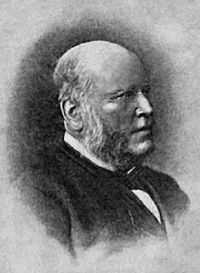Robert Morier

Robert Burnett David Morier (31 March 1826 – 16 November 1893) was a British diplomatist.
Born in Paris, Morier was descended from a family of diplomatists of Huguenot origin, the best known of whom were his father David, consul-general for France and minister at Bern, and his uncle James, the author of The Adventures of Hajji Baba.
After a somewhat defective private education he came up to Balliol College, Oxford. Here he attracted the notice of Jowett, under whose influence his brilliant but wayward mind obtained the discipline of which it stood in need. The relation of tutor and pupil developed into a friendship of rare warmth. Writing towards the close of his life, Jowett, who inspired more devoted friendships than any man of his time, spoke of Morier as his kindest and best friend for forty-five years.
On leaving Oxford, Morier at first obtained an appointment in the Education Department, but resigned in 1852, and in the following year became attaché at Vienna. In the succeeding years he was attached in turn to almost every court in Germany. Restless in temperament and unconventional in method, he plunged into the vortex of German politics to a degree that did not always accord with the traditions of diplomacy.
The most important years of his career in Germany were from 1866 to 1871, when he was secretary of legation at Darmstadt. Here he became a trusted adviser of the crown princess, and through her acquired an intimate friendship with the crown prince (afterwards the emperor Frederick III), whose antagonism to Bismarck's reactionary policy met with cordial support from Morier's sturdy Liberalism. Bismarck, already jealous of British influence at court, honored Morier with a hatred not lessened by the fact that Morier's knowledge of German politics was unrivalled outside Germany. On leaving Darmstadt, Morier became chargé d'affaires, first at Stuttgart, and then at Munich, and in 1876 was appointed minister at Lisbon. From 1881 to 1884 he was minister at Madrid. In December 1884 he became ambassador at St. Petersburg, and almost immediately had to face the alarming situation created by the Russian advance to Penjdeh. Thanks to his efforts, a war that at one moment seemed inevitable was averted. His great popularity at the Russian court contributed towards a marked improvement in the relations between the two countries.
Bismarck took alarm at the lessening influence of Germany over Russia, and tried to procure Morier's downfall. The Kolnische Zeitung declared in December 1888 that Morier had made use of his position at Darmstadt during the Franco-Prussian War to betray the movements of the German troops to Marshal Bazaine. The authority for this charge was an alleged declaration made by Bazaine to the German military attaché at Madrid. Bazaine had died in September, but Morier had heard rumours in July of the charge brought against him, and had procured from Bazaine a written denial, which he now published in The Times. Apart from this, it was clearly shown that Morier could not have transmitted the information by the alleged date, and that Bazaine, according to the testimony of his own books and of other officers, received the information in question by reports from the front. As a matter of fact, Morier was an ardent champion of the German cause. His correspondence with Jowett shows the latter vainly endeavouring to convince his friend that the French were in the right. Public opinion everywhere, except in the German conservative press, attributed the charge to political motives.
Morier's failing health caused him, at his own request, to be appointed Lord Dufferin's successor at Rome in 1891; but it was felt that he could not be spared from St. Petersburg, and there he remained until forced to find a milder climate. It was then too late, and he died at Montreux in Switzerland on November 16, 1893.
References
 This article incorporates text from a publication now in the public domain: Chisholm, Hugh, ed. (1911). Encyclopædia Britannica (11th ed.). Cambridge University Press
This article incorporates text from a publication now in the public domain: Chisholm, Hugh, ed. (1911). Encyclopædia Britannica (11th ed.). Cambridge University Press
| Diplomatic posts | ||
|---|---|---|
| Preceded by ? |
British Chargé d'affaires to Württemberg 1871–1872 |
Succeeded by George Petre |
| Preceded by Sir Henry Howard (as Minister) |
British Chargé d'affaires to Bavaria 1872–1876 |
Succeeded by Edward Stanton |
| Preceded by Hon. Edward Bulwer-Lytton |
British ambassador to Portugal 1876–1881 |
Succeeded by Sir Charles Lennox Wyke |
| Preceded by Hon. Lionel Sackville-West |
British Ambassador to Spain 1881–1884 |
Succeeded by |
| Preceded by Sir Edward Thornton |
British Ambassador to Russia 1884–1893 |
Succeeded by Sir Frank Lascelles |
|